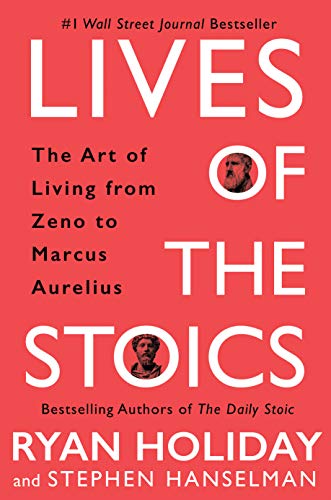
Lives of the Stoics: The Art of Living from Zeno to Marcus Aurelius

His job, Cato believed, in a tradition begun by Diogenes, was to serve the public good. Not himself. Not expediency. Not his family. But the nation. That’s what real philosophy was about, whether his skeptical great-grandfather or fame-chasing friend Cicero understood it or not.
Stephen Hanselman • Lives of the Stoics: The Art of Living from Zeno to Marcus Aurelius
Life is not fair and it cares little for our feelings or our plans.
Stephen Hanselman • Lives of the Stoics: The Art of Living from Zeno to Marcus Aurelius
Aristo had seemed to think that philosophy was for the wise man exclusively, for the individual’s self-actualization. His Stoicism worked well in the classroom, and raised interesting debates, but it would not work in the world. Diogenes saw Stoicism differently. It was a way of thinking—as well as a set of rules—for serving the common good, for se
... See moreStephen Hanselman • Lives of the Stoics: The Art of Living from Zeno to Marcus Aurelius
What’s interesting is that Antipater thought that most of these ethical questions were pretty straightforward. His formula for virtue was “in choosing continually and unswervingly the things which are according to nature, and rejecting those contrary to nature.”
Stephen Hanselman • Lives of the Stoics: The Art of Living from Zeno to Marcus Aurelius
Philosophy for the previous several centuries had been primarily a classroom exercise. It had been about the pursuit of the good life—about truth and meaning—but for the student first and foremost. Almost all the philosophical schools—Cynic, Platonist, Aristotelian, Epicurean, even Stoicism—had tuned out the real world of social and political life.
Stephen Hanselman • Lives of the Stoics: The Art of Living from Zeno to Marcus Aurelius
At some point, though, every traveler must come home,
Stephen Hanselman • Lives of the Stoics: The Art of Living from Zeno to Marcus Aurelius
Panaetius, while born to privilege, chose not to settle into that comfortable life of ease. Instead, he openly embraced duty and the responsibility of a much broader stage. He took the resources he was given and leveraged them, becoming the best version of himself and contributing as much as he could to the big projects of his time.
Stephen Hanselman • Lives of the Stoics: The Art of Living from Zeno to Marcus Aurelius
You can and should be interested in everything, the Stoics taught, because you can and should learn wisdom from everything. The more you experience, the more you learn, and, paradoxically, the more humbled you are by the endless amounts of knowledge that remain in front of you.
Stephen Hanselman • Lives of the Stoics: The Art of Living from Zeno to Marcus Aurelius
Humanity is given these instincts toward virtue by nature, and we can thrive and live nobly if we learn to live consistently with our own nature and our duties, while making the most of the resources we have been given.